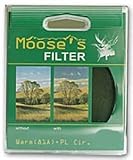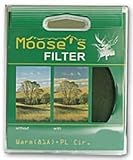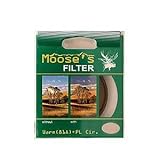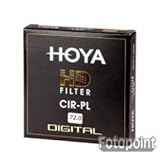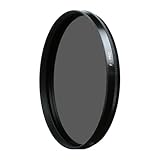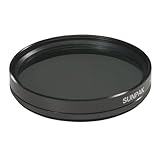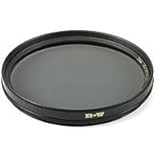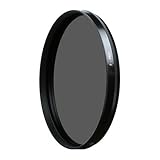
Average Reviews:

(More customer reviews)Many people don't understand polarizing light, so they expect more from these filters than they can deliver. Polarizing filters depend upon the angle of the light essentially being at right angles to the axis of the camera lens. When used with a very wide angle lens, the likelihood of that light being at a uniform angle to the axis is about nil. As a result, when you look through the viewfinder, and rotate the filter, you should expect to see non-uniform darkening of the sky, when used with a wide angle lens. However, once the light hits trees, fields etc., it is scattered -- so the inconsistency of polarizing effect is much less pronounced. The issue is solely in sky. You may be able to reduce that effect by shooting at a different angle to the source of light (sun) - but that probably won't include the scene. Even if you fix the aperture and shutter speed, you can't shoot multi-image panoramas with a polarizing filter.
Other points: It will do very little at mid-day at times of year when the sun is dead above you. Or when the sky is overcast (although the Moose will warm the cold light of that day). Or when the sun is at your back.
Having said that, the Hoya Moose filter is the most satisfying I have used in nearly 50 years of photography. The warming effect is simply beautiful. I bought mine (62, 67 and 77mm) before a trip to New Mexico last winter, and whether shooting from the ride up to the Scandia Tramway or Ghost Ranch where Georgia O'Keefe painted, the results were consistently spectacular. I used it on a 17mm F3.5 Tokina ATX-Pro in the Southwest, and again in Israel, and whether shooting old rocks or old temples, the effect was a blow-away. I ordinarily detest putting a $70 piece of glass in front of a $700 lens, because the risk of inter-surface reflections cutting contrast is pronounced.* But when the light was right, that Moose was on the lens most of the day.
If you've never used a Moose, you will be astounded at how it can turn rather ordinary scenes into extraordinary. In environments like the Southwest, where pollution is minimal, the effect is to intensify edge sharpness. Texture, landscape tone, and general details will "pop" if the light is right for a polarizer. Just understand that, by blending an 81A with a polarizer, it will "warm" snow -- so be prepared to cool that down in digital postprocessing.
I just got a new 18-200mm Nikon VR lens, and debated whether I should get a new 72mm for it, or a cheaper adapter for my 77mm. I decided that to use the lens shade, I'd buy another Moose.
If you've been persuaded to buy one, leave me a comment after your first shoot -- and tell me how happy you are!
*Consider that, when you keep a skylight filter on your lens to "protect" it. It may "protect" you from getting getting the best deep-shadow detail your lens can deliver. And if your lens gets hit from the front, the filter shards will wipe out your lens, anyway...so use a lens shade to "protect" your lens from fingers and dirt.
Click Here to see more reviews about:
Hoya Moose - Filter - warm circular polarizer - 77 mmCollaboration between respected wildlife photographer and conservationist B. Moose Peterson of Wildlife Research Photography and THK Photo Products, Inc., has created a circular polarizing filter that uses 81A optical glass made by Hoya, the worlds largest optical glass manufacturer, instead of the clear optical glass of a normal circular polarizer. When using a camera with a split beam metering system (a metering system that employs a polarized half mirror) which is most of today's auto focus camera bodies, traditional linear polarizers will cause exposure errors do to their light absorption properties. Circular polarizers yield the same optical effect while not causing exposure problems with modern metering systems. For many years, polarizers have been used to remove reflections from non-metallic surfaces such as water and glass as well as being used to darken blue skies to increase contrast in scenic photography. A side effect of both linear and circular polarizes is they "cool down" or make the over-all color balance of a scene slightly bluish. The addition of the 81A glass corrects the color temperature, bringing the scene back to the original 5500K for daylight film's color balance. The 81A glass creates a much more pleasing and "warm" color balance to the entire scene while the circular polarizer increases color contrast and reduces the effect of atmospheric haze.
 Get 45% OFF
Get 45% OFF
Click here for more information about Hoya Moose - Filter - warm circular polarizer - 77 mm



